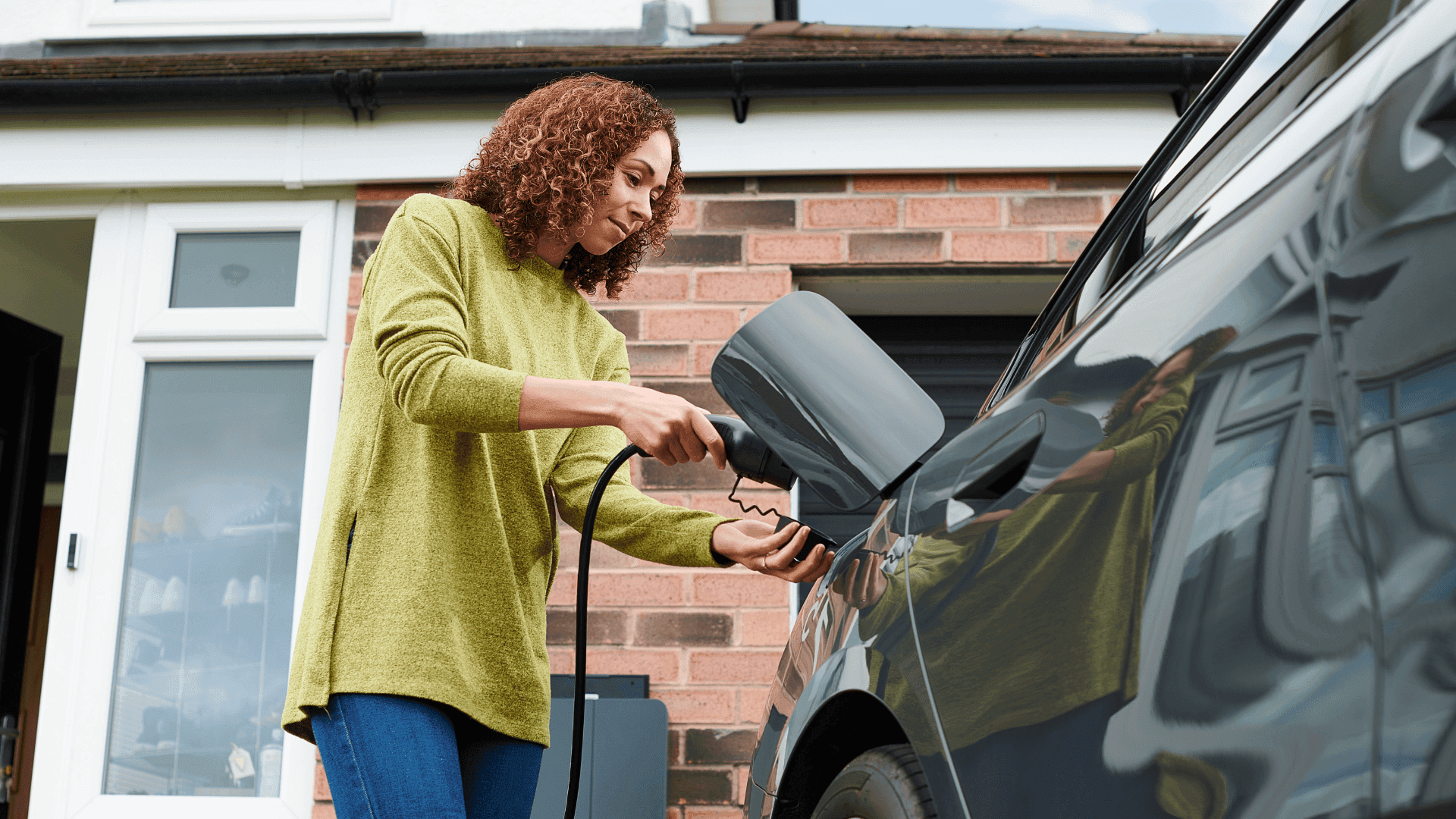- Home
- EV charging
- EV charging explained
What is EV charging and how does it work?

EV charging explained
What is EV charging?
Much like visiting the petrol station to refill your petrol or diesel vehicle, EV charging allows you to recharge the battery in your electric vehicle by plugging into a charger. Our charging solutions can assist you in charging your electric vehicle wherever you go, whether it's at home, at your workplace, or on the road.
An EV charger draws an electrical current from the power grid and delivers the electricity to the vehicle’s battery, like any other appliance you charge by plugging into a wall socket. EV charging can occur at home, at public charge points, or at work, offering flexibility and convenience to EV owners.

Basics of EV charging
How does EV charging work?
There are several types of EV charging, each with varying charging speeds. A popular method is to install a charge point at home, which uses an alternating current (AC) and has a maximum output of 7kW. The average charging time is around 8 hours, and many users prefer to charge their EV overnight to take advantage of off-peak energy tariffs for cheaper charging. Home EV chargers can also be connected to existing or new solar panels, creating the opportunity to charge for free by utilising excess solar energy.
AC chargers can go up to 22kW, and are suitable for both residential and workplace settings, offering faster charging speeds. Direct current (DC) chargers are larger and more powerful than AC chargers, with charging capabilities of up to 350kW. DC chargers can charge an EV to 80% in under an hour on average and are often found at motorway service stations, making them ideal for long journeys, as well as fleets and taxi companies that need a quick recharge.

EV charging connector types
It’s essential to know which chargers and connector types are compatible with your EV model as different vehicles require specific connectors to charge:
Type 2 CCS connectors
CCS (Combined Charging System) is the most commonly used DC charging connection, containing a combined AC and DC port.
Type 2 connectors
Type 2 sockets are found in most EV models and support up to 22kW of AC charging.
CHAdeMO connectors
CHAdeMO connectors are used for DC charging and are popular among older EV models such as the Mitsubishi Outlander PHEV.
Type 1 connectors
Type 1 sockets are typically found in older EV models and support up to 7kW of AC charging.
EV charging rates explained
When it comes to charging an electric vehicle, the most economical option is usually to charge at home, especially if you have an off-peak electricity tariff. On-road charging prices are generally higher.
To calculate the cost of charging your EV, you should consider the cost in cents per kilowatt-hour (kWh), rather than cents per litre. A kWh is a standard unit of measurement of energy that your supplier uses to bill you.
The cost of charging electric vehicles depends on several factors, including the battery capacity, charging speed, and the electricity tariff you use. To estimate the cost of charging at home, you can multiply the battery size of your EV by the electricity price per kilowatt-hour (kWh) from your supplier.

EV charging process
Using a home EV charger is very simple, often you just plug the connector into your vehicle to charge. You can monitor and control your charging through a smart EV charging app that’s linked to your hardware. From here you can create charging schedules, start and stop charge sessions remotely and view your energy usage. When using public or on-road charge points, users are required to verify their identity or payment information before initiating a charge session. This is done through various methods, such as RFID charge cards, smartphone apps, or contactless payment. Once authorised, the user plugs the charging connector into their vehicle, and the charger communicates with the vehicle to determine the charging rate and battery status.

EV charging times
Calculating EV charging speeds depends on several factors, including the onboard charger size, charging rate, state of charge, battery health, and even temperature.
As a general rule, you can estimate the time it will take to charge your EV by dividing the battery size (kWh) by the charger power (kW). At home with a 7kW charger, the Tesla Model Y would take approximately 10.5 hours to charge fully, making overnight charging a convenient solution for a guaranteed full battery.
If using a 22kW charger at work, the Tesla Model Y would take around three and a half hours to charge.
On the road, using a 100kW charger at a motorway service station, the Tesla Model Y would take approximately 45 minutes to charge.
It is worth noting that your EV will not charge at the maximum charge rate for the entire charge session, particularly for DC chargers with a higher kilowattage. Charging starts relatively slowly, quickly increases to 80%, and then reduces again as the battery approaches full charge. This maximises charging efficiency and helps preserve battery life.

EV charging best practices
Electric vehicles (EVs) rely on Lithium-ion (Li-ion) batteries that deteriorate naturally over time, leading to reduced battery capacity and range. On average, EV batteries last upwards of 10 years and lose around 1-2% of their range each year. To prolong the life and efficiency of your EV battery, consider following these tips:
Drive at a steady speed to avoid sudden acceleration and braking, which consumes more energy and drains the battery faster.
Use your EV's eco-mode to conserve energy by limiting features that consume the most energy, such as air conditioning.
Charge up to 80% and avoid letting the battery level drop below 20% whenever possible. This can prevent premature battery degradation. However, it's okay to charge to 100% for long trips occasionally.
Avoid frequent rapid charging, which can lead to battery degradation and reduce your vehicle's overall range over time.

Partnership
Why choose Radius?
With innovative solutions built around the needs of our customers, we've established an international reputation for helping businesses grow sustainably.
Expertise
Our team has over 34 years of experience helping more than 400,000 customers globally.
Trust
We are an internationally-acclaimed provider with numerous awards for our products and services.
Choice
Choose from our range of fleet, mobility and connectivity solutions that can be tailored to suit your needs.
Solutions
Use our award-winning technology and services to save your business time and money.



Need help?
Can’t find what you are looking for?
The customer support team at Radius Ireland provides an Island of Ireland service with four offices in Northern Ireland and four in the Republic of Ireland to best serve our clients' needs.
Contact us
